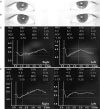Abstract
Purpose
We report a case of a male with bilateral tonic pupils associated with syphilis, that partially improved after syphilis treatment.
Case summary
A 27-year-old male presented with a 2-month history of near vision impairment. The right and left pupils were 5.5 mm and 6.5 mm in diameter, respectively, in the dark and 5.3 mm and 6.1 mm, respectively, in the light. Both pupils demonstrated light-near dissociation, slow constriction and redilation when looking at near, and constriction after instillation of 0.0625% pilocarpine. Serological tests were positive for syphilis, while cerebrospinal fluid testing was negative. Two months after treatment with intramuscular injection of benzathine penicillin G, his near vision subjectively improved and the right and left pupils were 5.9 mm and 6.4 mm, respectively, in the dark and 4.8 mm and 5.3 mm, respectively, in the light. The size of both pupils decreased and the pupillary light responses partially improved in both eyes.
Figures and Tables
 | Figure 1Pupil sizes before and after instillation of 0.0625% pilocarpine. (A) On initial examination, the minimal pupil sizes were 5.3 mm on the right and 6.1 mm on the left. (B) After instillation of 0.0625% pilocarpine, both pupils showed significant constriction, suggesting cholinergic denervation supersensitivity. (C) Results of digital pupillometry on initial examination showing decreased constriction (CON) to light. (D) Results of digital pupillometry after instillation of 0.0625% pilocarpine showing decreased pupil sizes in both eyes. MAX = maximum pupil diameter; MIN = minimum pupil diameter; CON = (MAX-MIN)/MAX; LAT = latency; ACV = average constriction velocity; MCV = maximum constriction velocity; ADV = average dilation velocity; T75 = time to reach 75% recovery. |
 | Figure 2Pupil sizes after treatment with benzathine penicillin G. (A) Two months after treatment with benzathine penicillin G, minimal pupil sizes decreased to 4.8 mm on the right and 5.3 mm on the left. (B) Results of digital pupillometer two months after treatment show partially improved pupillary light responses (CON, MCV, ACV) in both eyes. MAX = maximum pupil diameter; MIN = minimum pupil diameter; CON = (MAX-MIN)/MAX; LAT = latency; ACV = average constriction velocity; MCV = maximum constriction velocity; ADV = average dilation velocity; T75 = time to reach 75% recovery. |
References
1. Loewenfeld IE. The Argyll Robertson pupil 1869–1969. A critical survey of the literature. Surv Ophthalmol. 1969; 14:199–299.
4. Sakai T, Shikishima K, Mizobuchi T, et al. Bilateral tonic pupils associated with neurosyphilis. Jpn J Ophthalmol. 2003; 47:368–371.

5. Englestein ES, Ruderman MI, Troiano RA, Digiovanni VJ. Dilated tonic pupils in neurosyphilis. J Neurol Neurosurg Psychiatry. 1986; 49:1455–1457.

6. Thompson HS. Adie's syndrome: some new observations. Trans Am Ophthalmol Soc. 1977; 75:587–626.
7. Bowsher D, Lahuerta J. A case of tabes dorsalis with tonic pupils and lightning pains relieved by sodium valproate. J Neurol Neurosurg Psychiatry. 1987; 50:239–241.

8. Yasaki S, Ohshima J, Yonekura J, et al. A case of early syphilis presenting general paresis-like symptoms and bilateral tonic pupils. Rinsho shinkeigaku. 1992; 32:994–999.
9. Ohya Y, Matsumura T, Kojima S, et al. Bilateral internal carotid artery stenoses in a patient with meningovascular neurosyphilis. Rinsho shinkeigaku. 1993; 33:875–879.
10. Kim HB, Kwon OW, Chun GH. Bilateral tonic pupil in syphilis. J Korean Ophthalmol Soc. 1983; 24:877–881.
11. Gu X, Guan Z, Chai Z, Zhou P. Unilateral mydriasis as the primary sign of neurosyphilis. Infection. 2014; 42:215–217.

12. Takata T, Kamada M, Ikeda K, et al. Unilateral mydriatic tonic pupil as an early isolated symptom of neurosyphilis. J Neurol Sci. 2014; 344:219–220.

13. Bak E, Yoo YJ, Yang HK, Hwang JM. Quantitative pupillometry of the pupillary light reflex in Koreans. J Korean Ophthalmol Soc. 2017; 58:712–717.

15. Miller NR, Walsh FB, Hoyt WF. Walsh and Hoyt's clinical neuro-ophthalmology. 6th ed. Philadelphia: Lippincott Williams & Wilkins;2005. p. 761–764. Vol. 1.
16. Wabbels BK, Elflein H, Lorenz B, Kolling G. Bilateral tonic pupils with evidence of anti-hu antibodies as a paraneoplastic manifestation of small cell lung cancer. Ophthalmologica. 2004; 218:141–143.

17. Fugimoto F, Ghanem RC, Monteiro ML. Bilateral tonic pupil as the only remaining ophthalmic sign of Lyme disease: case report. Arq Bras Oftalmol. 2005; 68:381–384.
18. Millar E, Habib M, Gnanaraj L. Bilateral tonic pupil secondary to migraine in a child. J Pediatr Ophthalmol Strabismus. 2010; 47 Online:e1–e2.

19. Vetrugno R, Liguori R, Cevoli S, et al. Adie's tonic pupil as a manifestation of Sjögren's syndrome. Ital J Neurol Sci. 1997; 18:293–295.

20. Bae JS, Kim JK, Kim SH, Kim OK. Bilateral internal ophthalmoplegia as an initial sole manifestation of Miller Fisher syndrome. J Clin Neurosci. 2009; 16:963–964.

21. Sevketoglu E, Tatlı B, Tuğcu B, et al. An unusual cause of fulminant Guillain-Barré syndrome: angel's trumpet. Pediatr Neurol. 2010; 43:368–370.

22. Heuser K, Kerty E. Neuro-ophthalmological findings in sarcoidosis. Acta Ophthalmol Scand. 2004; 82:723–729.

23. Lambert SR, Yang LL, Stone C. Tonic pupil associated with congenital neuroblastoma, Hirschsprung disease, and central hypoventilation syndrome. Am J Ophthalmol. 2000; 130:238–240.

24. Holmes G. Partial iridoplegia associated with symptoms of other disease of the nervous system. Tran Ophthal Soc UK. 1931; 51:209–228.




 PDF
PDF ePub
ePub Citation
Citation Print
Print


 XML Download
XML Download